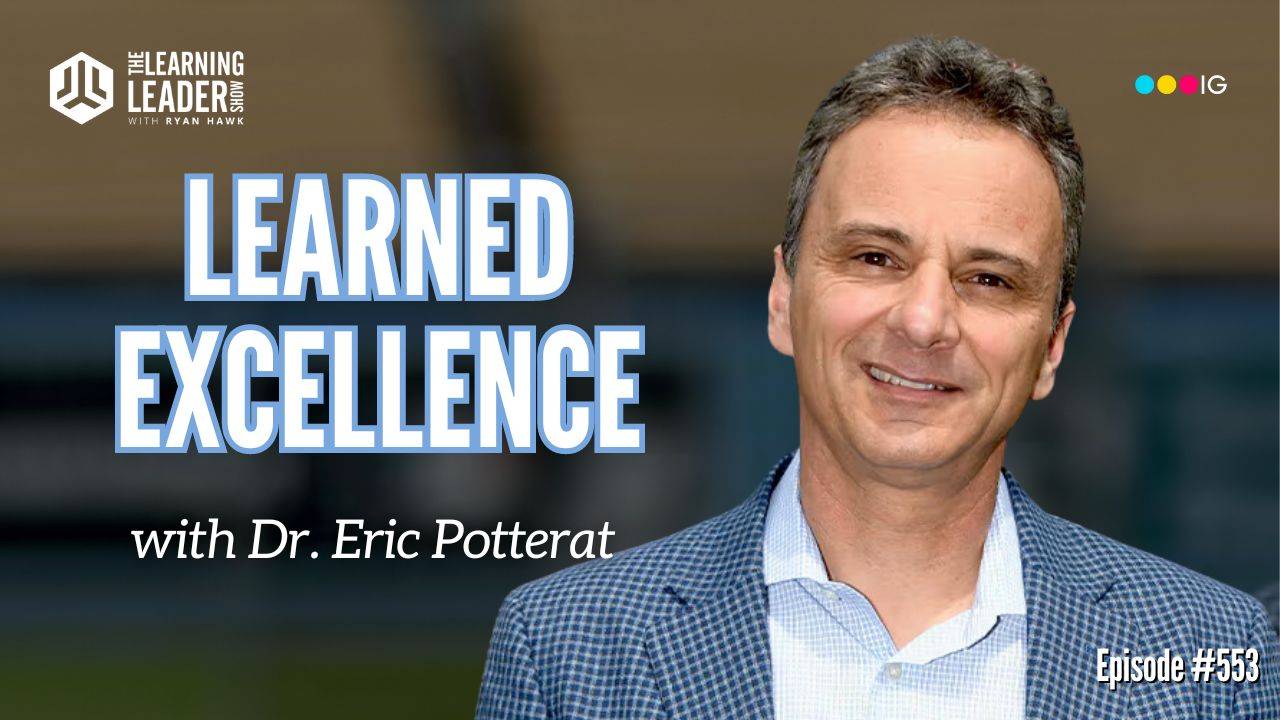Eric Potterat, Ph.D., is a clinical and performance psychologist. He retired as a commander from the US Navy after twenty years of service, during which he helped create the mental toughness curriculum used during Navy SEALs BUD/S training. Eric spent several years as the director of specialized performance for the Los Angeles Dodgers and has also worked with Red Bull athletes, the US Women’s National Soccer Team, the Miami Heat, numerous Olympic athletes, and NASA astronauts. He’s the author of Learned Excellence: Mental Disciplines for Leading and Winning from the World’s Top Performers.
WATCH this conversation on YouTube. And SUBSCRIBE!
Read my book, The Pursuit Of Excellence — See why Patrick Lencioni said “This book is an absolute must-read if you care to live an excellent life.”
FORBES called WELCOME TO MANAGEMENT, “the best leadership book of 2020.”
Be part of “Mindful Monday” — Text Hawk to 66866 Subscribe on iTunes or Stitcher Radio
The Learning Leader Show
- “Amateurs focus on outcome. Professionals focus on process.” And if you want to change the process, focus on just one change at a time. He used the fly fishing analogy. You don’t change all three at once. Try one change and re-evaluate.
- I love the idea of creating a personal checklist for yourself much like pilots fill out every time before they fly a plane. We should all create our checklist and fill it out consistently. This is a great tool to become more self-aware.
- Top performers have a thirst for feedback in victory and defeat. The leaders who sustain excellence over time are intentional about surrounding themselves with a kitchen cabinet who is there to regularly provide feedback so that they can iterate and improve. That’s one of the biggest differences between those who sustain excellence over time and those who don’t.
- Goal Setting
- 34%-42% chance of hitting a goal if you ideate it
- 62% chance of hitting a goal if you write it down
- 75% chance of hitting a goal if you verbally share it with others
- Eric developed a psychological “resilience” test that when combined with data on the candidate’s physical characteristics became a very good predictor of who would fail BUD/S (97%).
- While working with the Navy SEALs in San Diego, Eric frequently had guests come to observe the SEALs and how they worked. A lot of them were professional athletes like Tiger Woods, Lance Armstrong, Michael Phelps, and many more… While there, Eric asked to interview them. Over time he was able to build an extensive knowledge base of the mental approaches of the world’s top performers.
- “If your brain is firing, it’s wiring.” Learned from downhill skiers…
- Commonalities of leaders who sustain excellence:
- They accelerate what they value. They move from reputation to identity. They worry less about what others think.
- One of the biggest regrets of people on their deathbed is that they regret what they didn’t do.
- Capitlize now to have no regrets later.
- Create a credo (your identity)
- Mindset
- They have a growth mindset (instead of a fixed mindset)
- They are thirsty for feedback (they want feedback in victory and defeat)
- Eric is agnostic about motivations – Clean fuel vs Dirty fuel
- They have different mindsets for the roles they play
- Think of yourself as a dimmer switch — Sometimes you’re white hot, sometimes you need to dim down
- Efficient and Consistent
- They manage their time well
- They sleep 8 hours
- They don’t let life dictate what’s important to them.
- Time = Currency. Block time for what’s most important. Color code your calendar.
- Adversity Tolerance
- They control their human stress response
- They have a pre and post-performance routine
- They set goals
- They use visualization tools
- They compartmentalize well
- They use positive self-talk (they believe)
- They are good contingency planners
- They have high levels of self-awareness
- Like a pilot, they have checklists for themselves
- Balance and Recovery
- The more balanced, the more productive
- Feed all of your pillars
- Work
- Health
- Relationships
- Hobbies
- Spirituality
- Legacy
- They accelerate what they value. They move from reputation to identity. They worry less about what others think.
- Leadership role “Must-Haves”
- Emotional Intelligence – “Feel for a room”
- Empathy – Put our own perspective aside to understand others
- Curiosity – A desire to learn, to know more
- Apply to be part of my Leadership Circle
- Read: The Pursuit Of Excellence
- Read: WELCOME TO MANAGEMENT
- Be part of “Mindful Monday” — Text HAWK to 66866
- Read: Learned Excellence
- Connect with me on LinkedIn
- Join our Facebook Group: The Learning Leader Community
- To Follow Me on Twitter: @RyanHawk12
Time Stamps
00:34 – Commonalities of Sustained Excellence
03:06 – How Do We Become Identity Focused?
13:16 – Is Thriving from Haters Healthy?
17:33 – A Week With Marcus Luttrell
27:39 – Be More Efficient & Consistent
32:13 – Time Management “Hack”
38:21 – Thoughts About Goal Setting
45:29 – Balance and Recovery
50:59 – Qualities in a Great Hire
More Learning:
Episode 078: Kat Cole – From Hooters Waitress To President of Cinnabon
Episode 216: Jim Collins — How To Go From Good To Great
Episode #300: AJ & Keith Hawk – How To Instill Work Ethic & Curiosity In Your Children
Episode #303: General Stanley McChrystal – The New Definition Of Leadership


Leave A Comment